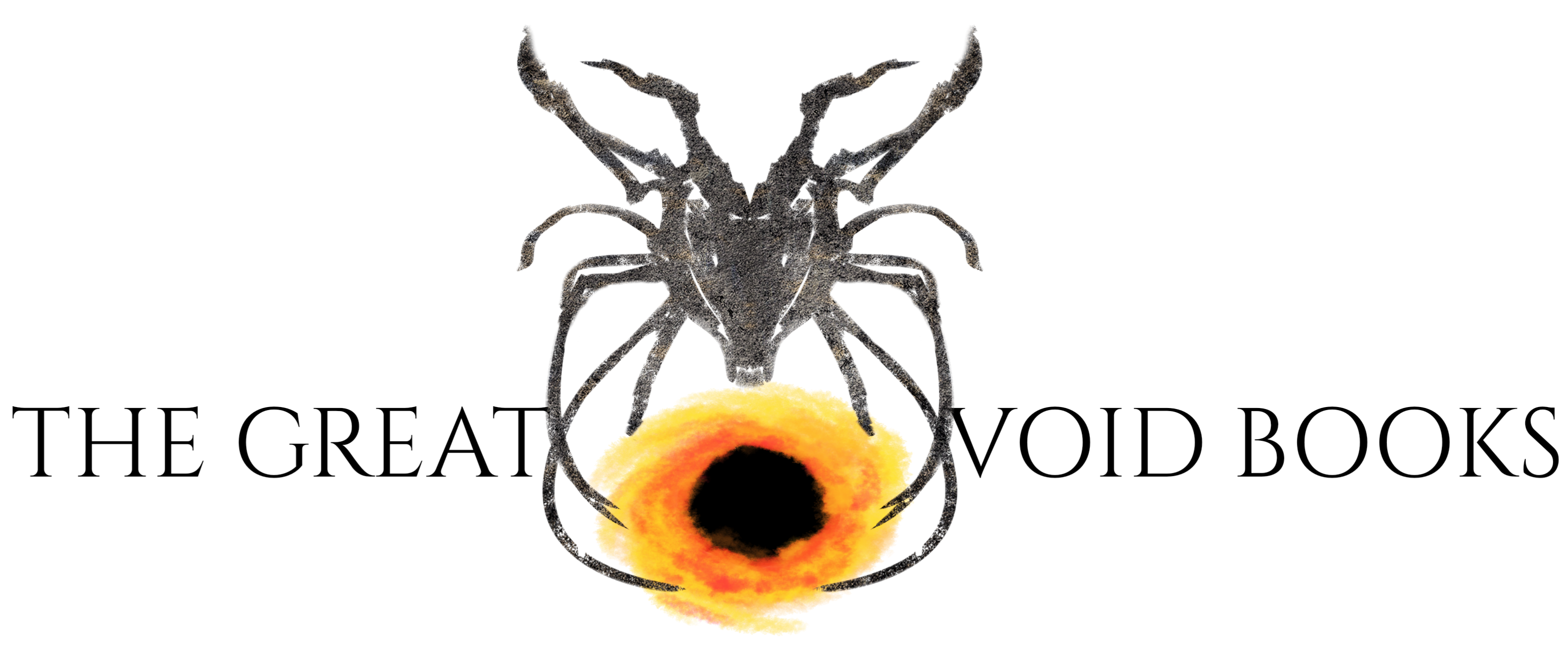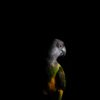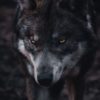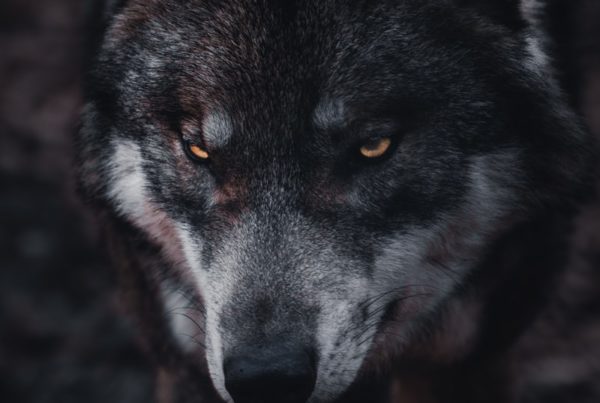Such beguiling and wonderful creatures birds were. Maybe Sharon was overreacting, taking the drama of her lost pet too far. Maybe she should somehow get past the sadness, get on with her life. Did she really have a choice?
The young woman understood that, like everything else, birds die, no matter how beautiful or loving. But the quiet inside her apartment was deafening, and she couldn’t let the grief go.
Then again, maybe she was losing her mind…
“Baby is dead,” Sharon repeated it aloud just to accept the reality of her pet’s death. Sorrow for her beloved parrot lingered like some awful smell, tears spilling when the young woman least expected them. It happened in the Shop-Rite when, glimpsing a Yellow-Nape on some magazine cover, she left behind a cart full of groceries and one bewildered cashier. Her eyes filled again when her Yoga instructor selected the old Karen Carpenter tune ‘Close To You’ (“Why do birds suddenly appear every time you are near…?”), and go try explaining your crying jag to a group of women during their Downward Dog stretch. Even in the middle of mindless sex, those floodgates opened. Her date moaned “Oh, Babe!” into Sharon’s ear, starting the deluge afresh. The guy fell silent, finished quickly, and never called again.
Sharon knew these reactions were inappropriate, but how could she dismiss Baby’s memory? Awful as her tears were, they helped expunge the poison inside. When her sister suggested, “You can always get another parrot,” Sharon almost responded, “Tell me something, Jillian. If little Micky went balls-up in his bassinet, think you and Barry might get another child?” But that stinging condemnation remained unspoken.
Memories, once pleasant, turned painful.
Ten years earlier Sharon knew nothing of raising a parrot, and an exotic bird was beyond the budget of a fledgling elementary school teacher. But while visiting Doc’s Bird Emporium one rainy Saturday afternoon, she changed her mind. Fresh out of his cage and occupying the perch that ran the length of the bird store, a young Yellow Nape took flight, selecting Sharon’s shoulder for his landing, then nibbling at her earlobe as if discovering an old friend. Sharon laughed at the bird’s boldness. With the Amazon parrot laying claim to her shoulder, she approached the salesgirl.
“How much for this feather duster?”
The Emporium worker’s name tag read DORIE, and she must have recognized an impulsive young buyer. The girl spoke low as if offering information she shouldn’t be sharing, instructing Sharon to think it over at home before leaving with the bird and an expensive cage to boot.“Parrots live a long time, maybe seventy years or more. He may outlive you,” Dorie informed her as if she held special affection for this breed.“We’ll put the little guy on hold should you decide in a few days—”
“—He’s so green. Like an emerald. Except for that little half moon of yellow under his eye.”
Dorie stroked the parrot’s back.“Birds have individual markings as different as their personalities—and this little guy is really affectionate. See his iris expand? That means he likes you. But, honestly, it’s an important decision. Maybe you should—”
Sharon’s decision-making abilities went on speed dial. She handed her credit card to the girl. “I’ll take him.”
Dorie hadn’t missed her customer’s sincerity and single-mindedness, and a sale was a sale. She ran the card, handed the sales slip to Sharon. “Okay, you have a new friend, and he’ll need a name for Doc’s records. By the way—‘he’ may be a ‘she.’ Boss-man says you can’t tell a parrot’s sex at this age, or even in maturity. Not without special surgery, and Amazons are hard to mate in captivity. Makes them worth a bit of change. So, about the name?”
Sharon read the sales slip: ‘For purchase—one baby parrot’—”Baby!” she announced. Male or female, the name worked.
“‘Baby it is!” Dorie added. “That little guy on your shoulder, I’m thinking he’s already bonding. Amazing the way he’s taken to you.”
The parrot nuzzled against her cheek, and Sharon grinned.
“It kind of is.”
◆
A parrot’s longevity wasn’t in the cards for the emerald Amazon. Illness took Sharon’s pet at ten years. Spitting up food and growing weaker, he no longer could manage the perch. Four days with the local bird hospital’s avian specialist brought the bad news. A large tumor had blocked all food intake.
“You can see it on the x-ray here.” Dr. Drazen told her.
The cancer inside Baby’s stomach appeared the size of a peanut, big enough to kill any bird dead within days.
“There’s nothing you can—there’s nothing—?”
“The tumor is in a bad location. I’m so sorry.”
It was that simple—and that difficult.
Inside Drazon’s inner office Sharon held her pet like a dying child for an hour, rocking him—or her, she never knew, but she’d always considered Baby a male. Sniffing back tears, she fed the bird a last peanut—his favorite treat—then held him as the doctor placed a small mask over the bird’s face to cause sleep so the needle used to euthanize him would create no pain. Baby’s eyes shut as Sharon’s pet went motionless and limp in her hands. The end came peacefully.
But Sharon’s pain was just beginning.
◆
Drazen’s euthanizing package included a cremation. A small leather box arrived from Forever After Pet Cremation Services, containing three tail feathers along with a four-toed footprint embedded in plaster. With this came an urn the size of a shot glass, and a commemorative certificate. On Sharon’s bookcase she displayed a personal memorial alongside a photo and a small locket she’d had inscribed with Your wings were ready but my heart was not. For weeks she couldn’t look at the urn without breaking down, but that didn’t stop her from standing before Baby’s shrine several times a day.
A month later the call came…
“Is this Sharon Meyerson?”
If this were another solicitor, Sharon would hang up. But the man’s voice was low, respectful as a funeral director’s. He identified himself as Dr. Howard Fehrman, another veterinary specialist like Drazen, probably making some routine follow-up grief counseling call, Sharon suspected. An unusual thing following a pet’s death, yet comforting.
“Last month you had your parrot cremated at Forever After Pet Cremation Services? You received some feathers and an urn?”
“Yes…?”
“You miss your pet. You miss him very much, don’t you?”
“Of course.” She waited, managing to remain polite, and added, “Look, I don’t understand what—”
“I think we may be able to do something about that. I’m going to give you an address, Miss Meyerson. Will you bring your pet’s feathers, those we sent you, and his urn with you, say tomorrow morning?”
It seemed an odd request with a definite urgency in it.
“Was there some mistake? What would you want with his urn?”
“We’ll talk about that.”
Maybe the man had made a dozen similar calls that morning. Sharon scribbled the address, not certain why she did. Thanking her, Fehrman said nothing more.
◆
I think we may be able to do something about that…
Those words proved enough to bring Sharon to 613 Decater Street. She would try anything to get through the unrelenting misery. The Forever After building was small, miles from Route 9 as if hiding from the world. This impression seemed verified by the absence of even one sign that labeled the pet crematorium for what it was. From the road nearby, the place was easily missed, and on her first attempt, Sharon had driven past it. The only entrance, a door in the building’s rear, wasn’t locked. There was a front desk with no one behind it. No wall pictures either, nothing decorative in sight. But who would expect cheerfulness inside a place that incinerated dead pets?
Sharon carried the urn and box containing Baby’s long tail feathers in a large and unstylish pouch. She hit the silver bell on the desk. A man, very tall and dark, appeared within seconds.
“You must be Sharon Meyerson.” He extended a huge hand that almost swallowed hers. “I’m Dr. Howard Fehrman…”
Sharon removed the contents of her bag, placing them on the desk. “You wanted me to bring Baby’s—well, these things. Were you the one who—?”
The man attempted a smile. “Cremated your pet? Yes. That’s why I wanted to talk with you. I know you’ve been extremely upset over your loss. Dr. Drazen went into some detail about your reaction, and his wife takes that yoga class you’re in. She saw—well, you know what she saw. You were very upset, weren’t you?”
“I suppose I made a fool of myself. I’ve had a hard time getting over this. I live alone, and Baby’s companionship meant a lot.” Sniffing back an unwelcome tear, Sharon went for the save. “Death sucks.”
Fehrman placed a hand on her shoulder. “We don’t really get over grief, do we? It just goes underground and has the nasty habit of resurfacing from time to time. We learn to get on with our lives, but that emptiness is always there.”
“Preaching to the choir, Doctor.”
“I’ll share something the choir doesn’t know, Miss Meyerson.” He picked up Baby’s small urn, held it before Sharon’s face. “For one thing, you don’t really understand what’s inside this tiny container. None of our grieving pet owners do.”
“It’s ashes. What else could it be?”
(Don’t cry, dammit!)
“Science can read a lot in the remains of a living thing, Miss—Sharon. We’ve come a long way since that sheep, Dolly. Do you remember her story?”
“She was the first mammal cloned, sometime during the ’90s. But she didn’t live long. Six years or something. Fehrman nodded his agreement. “Science hasn’t perfected the process. An ordinary cell was used to replace the nucleus of an egg cell, so all of Dolly’s cells had identical DNA to the one parent donor. This form of cloning produced a single genetically identical offspring. Well, that’s all scientific jibber jabber. But a mammal is a rather complicated creature. Whereas—”
Sharon saw where this was going. “…whereas a parrot’s genetic makeup is simpler? Are you saying you want to clone Baby? You cremate pets here, then create new ones, is that what you’re telling me? Is this animal crematorium some sort of front for you to play God?” Sharon paused and took a deep breath. “Sorry. Baby’s death is a sensitive issue with me.”
Fehrman had a ready response. “How would you feel about Baby’s rebirth? He was bonded to you, Sharon, and you with him. That bond should show in his DNA, in his genetic memory of you. That’s very important to us—and I imagine to you. He’ll be different in some ways, of course, that’s to be expected. But in many respects you’ll have your beloved companion back, free of charge.”
Sharon thought that over. “That’s very generous of you, Dr. Fehrman. But wouldn’t it make more sense to bring back someone’s dog or cat, even a monkey? Something domestic and a little closer to human? I mean, they’ve already cloned that Dolly—”
The man’s cell rang, and Fehrman stepped away to speak. The call’s timing seemed a little too perfect, but that probably was Sharon’s skepticism showing. If this were really a way to bring her Baby back—or even some scientific simulation of her cherished pet—then she was for it. Why would she feel otherwise?
In a repeat of her impulsiveness on the day she’d adopted Baby at the Bird Emporium, Sharon signed the papers Fehrman set before her. The doctor spilled some of the urn’s ashes into a small plastic pouch; two of Baby’s tail feathers he placed into another. He returned what remained inside the urn and leather box to Sharon.
“I know having these are important for you to keep. Death doesn’t have to suck, Sharon.”
She left the Forever After Pet Cremation office smiling, hopeful.
Why would she feel otherwise?
◆
The phone call came sooner than Sharon expected. Four weeks to the day, Dr. Fehrman spoke, “Miss Meyerson—Sharon. Your feathered friend—Baby—is ready for your—your reunion, I suppose is the right word. I think you’ll be very pleased.” The man’s voice didn’t conceal his self-satisfaction, but Fehrman’s certainty raised a dozen questions for Sharon.
“He wouldn’t be fully grown, would he? He couldn’t be. He would have hatched just days ago, isn’t that right? He’d be a featherless chick.”
“The process of your pet’s cloning would seem mumbo jumbo to you, Sharon, but—well, come see for yourself. We’ll be at our facility away from Forever After. It isn’t very far. Will you come today?” Jotting down the new address, Sharon climbed into her Toyota in under five minutes.
Requiring an hour’s drive, this place (nameless, apparently) appeared even more nondescript than the pet crematorium. Street signs were absent for over a mile, or maybe they’d been removed. The entrance was locked and Sharon rang the bell, an old-fashioned circular type that buzzed harshly with the effect of an electronically unlocking prison door.
Fehrman stood in the small foyer. “You’re very punctual. That’s good.”
There was no office area, just some worn-out chairs serving as a makeshift waiting room. Fehrman led Sharon to a back room. She half expected some sort of laboratory filled with test tubes and microscopes, maybe even a bubbling beaker or two for effect—a ridiculous thought, Sharon decided, as Fehrman didn’t seem the mad scientist type. The room contained only a tank holding a dark snake, coiled and not very long. On the same small table was a covered cage. A tall, skinny woman with a beak-like nose (Fehrman’s assistant?) stood silently at the door. Wearing a too-clean lab coat, she seemed solemn enough to be someone official. Sharon approached the covered cage but didn’t stand close.
“Is he under that sheet—Baby?” she asked, applying the name of her deceased parrot to her unseen cloned pet. It seemed appropriate. Lady Lab Coat stood motionless, a sentinel saying nothing. Fehrman and the woman exchanged expressionless glances before he spoke.
“I need to tell you something first, okay? I know you’re expecting to see your former pet, but—well, he won’t be exactly that. I don’t want you to feel disappointed if there are some differences.”
Mentally measuring the cage’s size, Sharon managed a smile. “You don’t have a vulture under wraps there, do you?”
“Experiments are just that, Sharon. Medical science isn’t always exact. We’re never sure of the results until we see them. Sometimes not even then. We have to wait to see if we’ve succeeded. And only you can tell us that. You knew your pet well, and he bonded with you. It will probably happen again, but…”
“—But it may not?”
Lady Lab Coat finally spoke, her eyes on the coiled reptile on the same table. “He’ll be different. Maybe a little. Maybe a lot.”
Fehrman placed his hands on the cage’s covering. “Why don’t we see for ourselves?” With a magician’s flourish, he removed the cover. Sharon half expected the man to shout ‘Voila!’ as if this were some tablecloth trick, but he said nothing. Sharon stared at the emerald bird perched inside a cage large enough to enable some flight. The parrot drew close to the bars. Each silently checked out the other. Then…
“He’s full grown!”
“Not quite, but almost. He’s got yellow coloring on his nape similar to a mature bird.”
“It’s Baby! It is him! He has that half moon patch under his eye! Dr. Fehrman—He knows me!”
Lady Lab Coat spoke again. “No, Miss Meyerson, it isn’t quite the same—”
Fehrman shook his head. “Baby died, Sharon. This bird isn’t your late pet. Not exactly. It’s a good copy of him, though, don’t you think?”
A disquieting thought struck her. “If this bird shares the same physical characteristics as my parrot, wouldn’t he—I mean, might he develop the same kind of tumor that Baby—?”
Lab Coat Lady and Fehrman exchanged glances. Fehrman spoke first. “We added some safeguards to this bird’s genetic make-up, Sharon. A little DNA from this snake you see here, for purposes of keeping your pet sturdy because snakes are stronger than birds and in captivity they can live for decades. I could explain it to you, but it would just be scientific babble. I can assure you this bird will be healthy.”
“There’s snake in him?” The thought seemed ludicrous.
“It’s a Kingsnake. Harmless, not poisonous. People keep them as pets. And, Baby—Well, this new Baby, he’s very much a parrot, as you can see. A potentially long-lived one.”
Sharon stood near the bars of the cage, watched the bird move close. “Open the cage! I need to see what he does!” Not waiting for the man’s response, she sprang the door lock herself, stepped back to watch the parrot’s actions. The Yellow Nape didn’t hesitate. He landed on Sharon’s shoulder, gurgling near her ear. With satisfaction bordering on ecstasy, he nibbled at her lobe.
Sharon felt the tears come, but these were the better kind. “It’s Baby! It’s him! He did this the first day I saw him at the bird store!” She turned to Dr. Fehrman. “He’s a little heavier—larger, too—but it’s him. Doctor, I know it!”
The woman in white remained deadpan and silent, but Howard Fehrman’s smile went broad. “He seems to recognize you, all right. That’s a good first step.” He reached for the parrot with both hands and placed him back inside the cage. “We’ll keep track of your progress with him, all right? We have some forms with questions. We’ll ask you to keep your new pet’s origins a secret for now. Can you do that?”
Sharon agreed. Lady Lab Coat produced a folder, handed it to her. “Send your answers once a week. New questions are dated, addressed envelopes are inside. Be honest, even if—” The woman caught herself, steered to the safer topic. “Or you can scan the Q and A sheets and email them. Contact information is on the questionnaire. We’ll give you a scale to weigh the bird to make sure he’s not getting fat.”
“I’ll help you carry his cage to your car,” Fehrman offered. “Diet’s the same as for any parrot. Your pal here will need flying room. No mirrors, no glass. Of course, you already know that.”
Sharon’s smile went as broad as Fehrman’s.
“Of course.”
Lab Coat Lady asked her only question, an odd one coming from a woman so dour, whose name and purpose remained a mystery.
“Will you love him, your new companion?”
Sharon’s face revealed her certainty. Her eyes met the woman’s.
“Do you have to ask?”
◆
THE FIRST WEEK
Jillian couldn’t take her eyes from her sister’s new pet. The parrot returned her stare. “How much is this new feather duster costing you?”
“What’s the cost of love, Jill?”
“Fine. But, my God, he looks just like Baby, right down to that yellow splash under his eye. How did you manage to find—?”
“Just a freaky thing. I knew he was coming home with me the minute I spotted him at the bird store. You don’t think it’s wrong to call him Baby also?”
Jillian grinned. “I doubt your late parrot would mind.” She studied the bird closer. “He seems larger, but otherwise—”
“Otherwise, he is Baby, right?”
Jillian’s eyes remained fixed on the Amazon. “If you say so.”
◆
Alone, Sharon filled in the questions on the form.
Did you experience any difficulties with your new pet during these first few days? If so, describe.
NO
The parrot seemed a fussy eater, but that wasn’t a difficulty as Sharon saw it. Still, he didn’t seem to like the bird food she placed inside his cage.
Did you notice any differences between your first and second pet, no matter how slight?
NO.
A small lie. Sharon chose not to give Dr. Fehrman a reason to reclaim her pet.
How responsive was your parrot to you? Describe:
Very responsive—He learned several new words and one trick—discovering a peanut that I hid up my sleeve.
Sharon fudged this answer also. The bird knew more than the peanut trick. He’d learned to talk, even to sing “Baby Love,” at least a few words—but Sharon hadn’t taught him. The parrot sang (badly!) simple lyrics from the chorus exactly like her late pet. Even stranger, the Amazon was larger than her late Baby at ten, an odd thing for a bird only weeks old.
As Fehrman requested, Sharon kept the information of Baby’s origins to herself. The lies she’d answered on the questionnaire she also kept to herself.
◆
THE SECOND WEEK
Sharon hoped she hadn’t made a mistake; already she was in too deep. She loved her new pet; there would be no turning back short of some messy heartbreak. She’d committed herself from the start to love the feathered creature. In her unique circumstance, she probably had committed to the Amazon parrot before the actual start. Likewise, the bird proved affectionate without her needing to win him over. There was no breaking-in period at all, no adjustment required for either of them.
Still…
There was the old tale of the girl who picks up a dying snake and nurses it back to health only to have it bite the shit out of her. She cries,“Why did you do that when I saved your life?” to which the snake answers “You knew I was a snake when you picked me up!”
Baby was no snake, but to Sharon’s touch his feathers now seemed more like scales and his vocalizations had become raspy croaks.
(“Kisss Bay-beee….”)
The bird’s warbling was cute in its own way.
Still…
Already Baby had grown much too large for his cage. He seemed okay thumping around on the hardwood floor or perching on shelves, but now he was putting away whole trays of seed in seconds, not pecking at them parrot-style as he’d done at first, but ingesting mounds of them in great gulps. And during one flight around the room he landed on the bookshelf and waddled to the small urn containing Sharon’s late parrot’s ashes. He pecked at the urn until it toppled to the floor, spilling the ashes it held. Sharon told herself this had to be an accident.
Had to be….
The week’s questionnaire asked:
Have you noticed any changes in your new pet’s appearance or behavior. If so, describe.
Sharon wrote she saw no changes.
She lied.
◆
THE THIRD WEEK
Sharon stopped answering Fehrman’s calls or updating his questionnaire. But Jillian proved persistent, and she had a key to Sharon’s apartment. Arriving unannounced, she stared at her sister’s new pet that perched on the bookshelf. The Amazon stared back, and Jillian’s eyes went wide.
“That bird’s almost the size of an eagle! You can’t keep that thing uncaged. He looks like he could tear you to shreds!”
“He wouldn’t. He’s tame. Watch this…” Sharon held out a peanut; tucking it into her sleeve, she held out her arm. The bird cocked his head, ruffling thick feathers as if grudgingly willing to cooperate.
“PEEEE-NUT! PEEEEEEEEEE—NUT!”
The bird tugged at her sleeve, its head too large to crawl inside it. Sharon pulled the peanut free and the Amazon grabbed it from her hand. She faked an unconvincing smile.
Jillian didn’t buy it. “Those growls don’t sound much like a parrot. Sharon, his beak could chew your hand clear off like a pair of garden shears.”
“You saw for yourself—”
“Your neighbors must complain about the noise, right?”
“They hear my stereo turned up loud. But no complaints yet.”
Shaking her head, Jillian lit a cigarette, something she usually avoided around her sister. “That bird is no parrot. I know you know that! Where’d you find him? No pet store on the planet would—” She took a long draw of her cigarette. “Can you get your money back?”
Sharon grabbed Jillian’s shoulder, practically knocking the cigarette from her hand. “You can’t tell anyone! You have to promise!” She collected herself, stroked the parrot-thing’s head. “See? He’s perfectly tame? Look at him.”
Jillian stubbed out the cigarette, faced her sister. “You shouldn’t keep that thing here. It’s not safe. He could grow into something from the Jurassic period. My God!”
Sharon continued stroking the bird’s head. “Touch him. Go ahead, Jill. You’ll see.”
Jillian stepped back. “No way. Nope! Nuh huh!”
“For me, okay?”
Jillian reached for her sister’s shoulder instead. “Do you remember when your goldfish died? You were, what, four? You refused to accept that dumb fish had bought the farm, insisted Mom not touch the bowl. He floated there dead for a week.”
“I remember. I called him Moby, like in that book—”
“Fuck that, Sharon! Suppose he comes for you in your sleep. I’m scared for you, okay?”
“You were scared of the original Baby too. Well, this Baby is harmless. Don’t be afraid.”
“I’m nor a bird person, Sharon. Birds belong in the trees. I’m not sure where this one belongs.”
“He belongs here with me.”
“Shit—Okay, fine. One touch.” Jillian reached out, stroked the bird’s head. Baby gurgled, leaned in.
Sharon’s grin widened. “See? He’s cute, huh?”
Jillian withdrew her hand, reached for her jacket. “I think your mother board has been hacked.”
“What’s that mean?”
“It means you’re out of your fucking mind.”
◆
(Jillian will come around. She will…)
But she didn’t. She refused even to visit.
The rational part of Sharon knew her sister had a point. Love could make you blind; also deaf and dumb with the refusal to see what’s right in front of you. Why else would women select men that beat the crud out of them; why would parents refuse to see the potential serial killer in the child who throws kittens down the well? And why would a little girl not realize that sometimes you just had to let love go, not keep it floating dead in a fish bowl? Had she been willfully blind?
(You knew I was a snake…)
Remembering her Amazon had that reptilian gunk in his DNA, Sharon stared at the empty bag of peanuts she’d tossed on the floor. One peanut alone no longer seemed enough, and lately her parrot seemed unwilling to perform or even to speak. Like some bird of prey, Baby went after treats by the handful, devouring shells and all. Worse, the Amazon eyed Sharon strangely, even hissing at her. The bird’s tongue, jutting in and out, seemed much longer—and forked.
And his size, like some vulture…
“You’re not much of a baby any more, are you? Or a parrot…”
(Suppose he comes for you in your sleep.)
Sharon phoned Dr. Fehrman, receiving his voice mail. “Doctor, this is Sharon Meyerson. Please come…”
On the book shelf Baby hissed loudly at her, his eyes deep red. Sharon went into the kitchen. A jagged bladed bread knife hidden behind her back, she approached her pet.
“I love you…”
◆
“Hello. This is Sharon. I’m unable to come to the phone. Please leave a message…”
Baby (the first one) sang some tuneless ditty to accompany the voicemail. Sharon had promised Jillian she would change the message, not cling to the dead parrot’s memory, but the message remained.
For days Sharon didn’t return her sister’s call, and that wasn’t like her. At the apartment circumstances proved much worse. Jillian discovered Baby was gone; even the cage he’d outgrown weeks earlier had disappeared. The place seemed cleaned of any evidence of the parrot-thing that had been Sharon’s pet. Clothes remained, as did Sharon’s Toyota and other belongings, but Jillian found no trace of her sister. There seemed no break-in nor a robbery, but Sharon and her pet had disappeared.
Jillian dialed 911.
Phone records indicated a late night call made to a number that had been disconnected and impossible to trace, common with burned-off cell phones. Sharon’s lap top had been wiped clean. Days became weeks. Nothing.
Jillian lay in bed, managing for once not to cry herself to sleep. She turned to her husband, shook him awake. Time had come to break her promise to her sister.
“Barry, this is going to sound crazy…”
◆
Deep within Jersey’s Pine Barrens, inside an old trailer, the man and woman, each in lab coats, stood over a small incubator. The woman spoke first.
“We really should get rid of the remains.” She indicated the two large urns placed on a nearby shelf. “Their ashes—we should dispose of—”
Fehrman seemed not to hear. “That bird tore out the Meyerson woman’s throat, and I have to live with that, Dorothy—and with the fact we closed the lab after those cremations and ran like fucking cowards. We created that hybrid—and for what? You know I can’t just toss those ashes.”
The woman loosened the starched collar of her shirt. “Was it cowardly to shoot him—that bird? You did what you had to do, Doctor. I’m not happy about it, but…” Collecting herself, she stood straight. “Science should do what it can do! DNA as a weapon? Why not? Any genetically domesticated creature of his strength must be of great value, otherwise Washington would never have approved our grant to—”
“—You called that bird-thing him.”
The woman opened the latch door of the incubator, closely studying what they had discovered concealed beneath a blanket inside the girl’s apartment. Sharon Meyerson secretly had kept the fragile object warm, and now the incubator was doing the same.
The skinny woman seemed satisfied with what she saw. She turned to Fehrman.
“It’s because the girl chose to see her pet that way. Mating with that Kingsnake, that bird proved conclusively it was not entirely a bird, as you say—nor a him, either. Have a look.”
Fehrman forced himself to study the incubator’s contents. He couldn’t help himself—he half smiled. It didn’t last long.
“Bird or reptile, what’s it matter if we’ve birthed some kind of monster?”
The woman smiled too, and hers lasted longer.
“Bird or reptile,” she repeated. “Some paleontologists would suggest that’s the genetic makings of a dinosaur.” She didn’t look inside the incubator. She didn’t have to. She knew the egg inside was the size of a football.
Fehrman watched as its thick shell began to crack.









